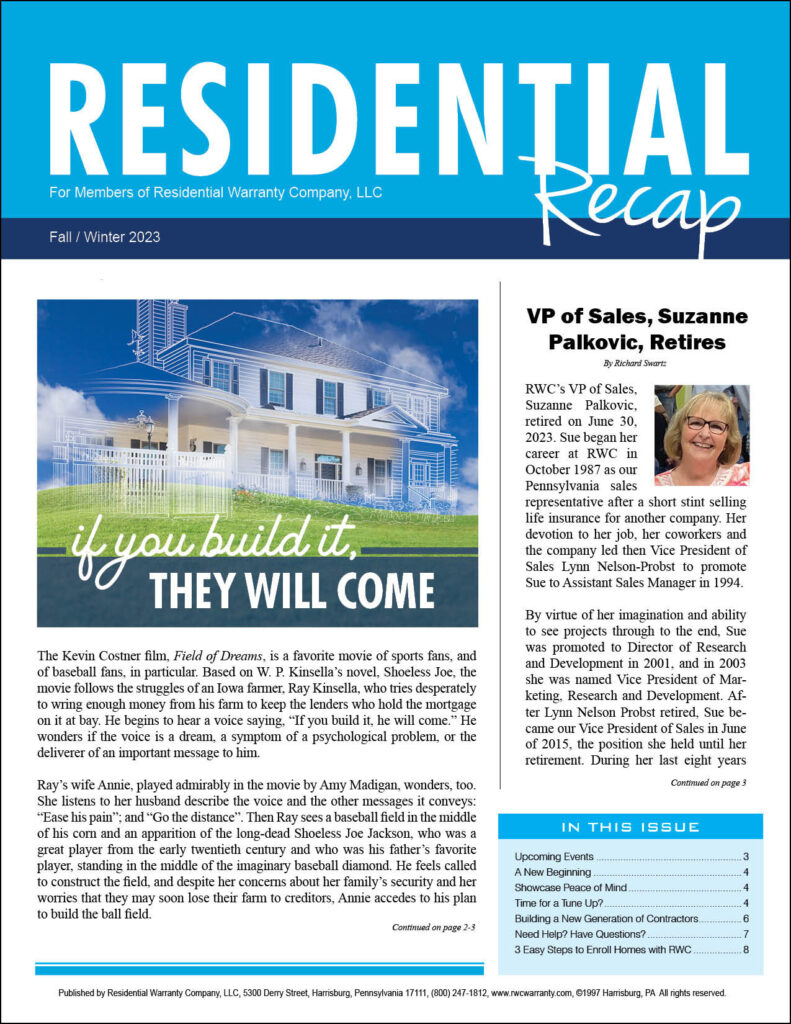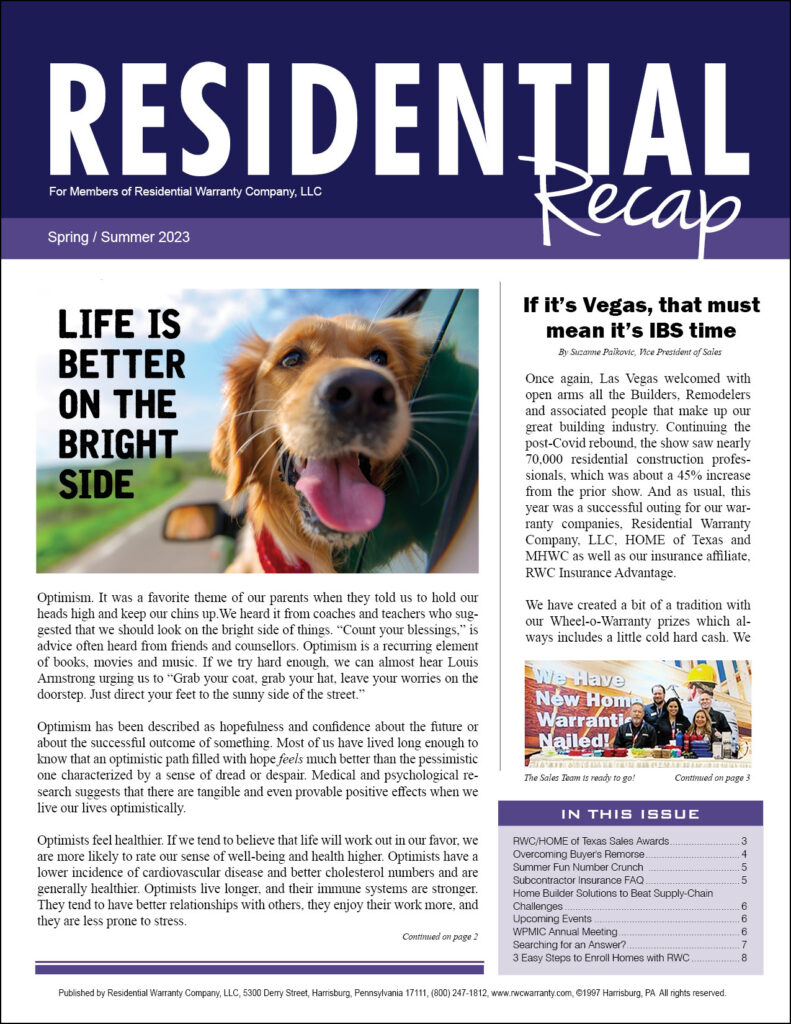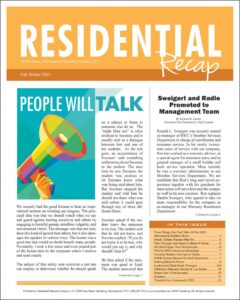Check out building/warranty/industry news, RWC announcements, upcoming events, etc.
Check out building / warranty / industry news, RWC announcements, upcoming events, etc.
 After decades of dedicated service and unwavering commitment, VP of Sales, Suzanne Palkovic, bid farewell to RWC & Affiliates this summer as she embarks on a well-deserved retirement.
After decades of dedicated service and unwavering commitment, VP of Sales, Suzanne Palkovic, bid farewell to RWC & Affiliates this summer as she embarks on a well-deserved retirement.
Sue began her career at RWC in October 1987 as our Pennsylvania sales representative after a short stint selling life insurance for another company. Her devotion to her job, her coworkers and the company led then Vice President of Sales Lynn Nelson-Probst to promote Sue to Assistant Sales Manager in 1994.
By virtue of her imagination and ability to see projects through to the end, Sue was promoted to Director of Research and Development in 2001, and in 2003 she was named Vice President of Marketing, Research and Development. After Lynn Nelson Probst retired, Sue became our Vice President of Sales in June of 2015, the position she held until her retirement. During her last eight years with the company, she managed our entire sales force and was a constant proponent of superior customer service for our builder members. Sue was a tireless worker for our company. Her strong leadership and keen understanding of the warranty marketplace contributed greatly to our companies’ success. We will miss her wit, her wisdom, her tenacity, and her dedication.
Sue is succeeded by our new National Sales Manager, Rich McPhee. Rich is new to the position, but not to the company, having served as a highly successful sales representative in the mid-Atlantic states for the last ten years. Sue had an opportunity to mentor Rich, and we are happy to report that he has hit the ground running.
Sue plans to travel, spend time with her family, and become more active supporting causes that are near and dear to her heart. She leaves RWC with our good wishes for a long, happy and healthy retirement and with heartfelt gratitude for many years of loyal service.
Check out building / warranty / industry news, RWC announcements, upcoming events, etc.
You’re a general contractor, a GC. Like it or not, you are responsible for everyone’s safety at your jobsites. That means anyone who may be there for any reason. Even trespassers who trip and fall over some debris left by your demo guy. That’s right. Even if you post “NO TRESPASSING” signs, you have some degree of care for any member of the public who is at your job site for any reason and gets hurt. What can I say? Life isn’t fair, then you get sued.
Any human activity involves risk. To really prevent having accidents at your jobsite you’d have to go back in time to that day when you decided to become a GC and decide to do something else. Until a time machine is invented, you’ll need General Liability (GL) insurance and you’ll want all your subcontractors to be adequately insured.
Why is GL insurance so important?
Let’s go back to the sloppy demo contractor who left the debris lying around for the trespasser to trip over.
If that demo guy doesn’t have insurance, your GL company will not only have to pay this claim; they will add the demo classification to your policy and charge you the extra premium. It’s hard enough to be sure your subs have enough insurance even when you require certificates each year.
For example, if one of your subs has a claim working for someone else and it reduces his/her limit of liability, that certificate you got a few months ago is suddenly out of date.
It says your subcontractor has $1,000,000 for each accident. Only now, the claim has reduced this amount to $500,000. Suppose one of your subcontractors had their GL coverage canceled or nonrenewed? If you’re listed as an additional insured on their policy you should receive a courtesy notice of cancellation… provided you asked for one and insisted it be shown on the certificate.
Either one of these possible scenarios can lead to a claim being made against your GL.
But what about that trespasser? Why should he be compensated for getting hurt while being illegally present on your jobsite? The answer has to do with the degree of responsibility you have to the public. Think of your own home as a jobsite. Let’s say you invite friends over to a Memorial Day picnic. You want them to be there. The last thing you want is for one of them to trip and fall over your garden hose laying in the yard because you failed to put it away.
The same is true for the delivery person and the guy who reads your gas meter. Then there’s the door-to-door salesperson or survey taker. You’re not as happy to see them, but you wouldn’t call 911 when they show up either. The one thing all these people have in common is a right to expect that you keep your yard, sidewalk and steps free of objects like your garden hose, stray toys and other debris when they come calling.
Even a burglar or a vandal is owed some degree of care. You can’t use excessive force to restrain a burglar and you can’t take the position that a trespasser should just watch their step if there is an unprotected hazard on your jobsite.
Failing to understand these things and take steps to minimize the hazards at your jobsite creates liability. Your subcontractors are your first line of defense against lawsuits.
Here are four things you can do to make sure your subcontractors are helping to reduce your chance of being sued:
• TRIP AND FALL HAZARDS that can’t be eliminated must be marked with signs, cones, reflective tape, etc., in such a way that they are obvious to the public.
• Require your subs to provide CERTIFICATES OF INSURANCE each year. These should show your subcontractors have their own GL coverage with limits of liability equal to yours.
• Insist that they name you as ADDITIONAL INSURED on their policies.
• Make sure they HOLD YOU HARMLESS in your contracts with them.
Never let up on your efforts to hold your subs to this high standard and to practice good jobsite preventive maintenance.
by Doug Davis, Eastern Atlantic Insurance Company
Click below to read about industry news, announcements, upcoming events, etc.
Stay up-to-date with the Warranty Company, Upcoming Events, & Industry News.
Risk Retention Group (RRG) vs. Property & Casualty (P&C) Insurer
 This comparison has been an issue for many builders considering joining a new home warranty program or switching their current carrier. Residential Warranty Company, LLC (RWC) has backed its warranties with a Risk Retention Group (RRG) since 1990. It is our philosophy that warranties insured with a stable RRG will provide our builders and their homeowners with secure and reliable coverage for the entire warranty term.
This comparison has been an issue for many builders considering joining a new home warranty program or switching their current carrier. Residential Warranty Company, LLC (RWC) has backed its warranties with a Risk Retention Group (RRG) since 1990. It is our philosophy that warranties insured with a stable RRG will provide our builders and their homeowners with secure and reliable coverage for the entire warranty term.
This philosophy and game plan has been designed and refined based on experience in dealing with both sides of the issue. For years, RWC backed its warranties with P&C coverage. We discovered, first hand, the downside of this type of arrangement. P&C coverage can be extremely volatile both in terms of rates and continuity.
When using a P&C carrier, a warranty company’s rate structure is vulnerable to rate increases derived from losses in totally unrelated industries. For example, the country has seen more than its fair share of both natural disasters and environmental catastrophes. Consider the losses caused by Hurricanes Katrina, Rita, Harvey, and Maria. If a P&C company suffers huge losses in even one of these events, the company’s rating may drop and it may be compelled to raise its insurance rates across all its lines of coverage. The end result is that a builder’s warranty rate goes up even though the warranty company’s loss ratio may be extremely low.
With an RRG, only one type of risk is insured - in this case, that means new home warranties and general liability insurance issued by RWC for our member builders exclusively. Consequently, our rates are based solely on our own loss ratio. If we continue to keep control of claims and continue to stringently screen members for quality, RWC will be able to maintain a sound and economically competitive rate structure. Oil tankers running aground and Category 4/5 Hurricanes will have no effect on the cost of a new home warranty or the strength of the insurance company!
RWC also discovered that P&C carriers are quick to drop blocks of business for a variety of reasons: too little premium generated, changes in corporate strategy, etc. If a P&C insurer chooses not to renew its master policy, the warranty company is left scrambling for a replacement. During RWC’s infancy, we found ourselves in this position all too frequently.
RRG’s are not fly-by-night organizations that are easily formed. Not only are they subject to insurance laws in their own domiciliary state, but they must also fulfill certain criteria before offering insurance in any other state. For example, each RRG must submit a copy of its plan of operation to the insurance commissioner of each state in which it intends to do business. It must also submit a copy of its annual financial statement to each state. Formation involves licensing, ownership and membership requirements. Failure to adhere to the strict mandates can subject groups to claims of unauthorized insurance activity.
We feel our members deserve an insurance structure that is committed to our program for the long haul. Additionally, we want backing that is financially strong enough so that our members can be certain it will be there in 5 years, 10 years and beyond. In terms of stability, security, economy and good old common sense, the move to an RRG was the most obvious and intelligent choice for RWC and our members.
 RWC has spent over 35 years building its reputation on superior customer service, competitive rates, effective dispute resolution and clearly defined warranty coverage. Being “builder oriented” is not a marketing gimmick for us but simply the way we do business every day. We concentrate on warranties and general liability for our members exclusively as our sole lines of business.
RWC has spent over 35 years building its reputation on superior customer service, competitive rates, effective dispute resolution and clearly defined warranty coverage. Being “builder oriented” is not a marketing gimmick for us but simply the way we do business every day. We concentrate on warranties and general liability for our members exclusively as our sole lines of business.
Consider the value of RRG-backed warranties and GL insurance. If you value stability of coverage and control over rates for long-term protection, you truly only have one good choice...an RWC home warranty and a GL insurance policy backed with one of the strongest insurance plans in the industry*.
*Western Pacific Mutual Insurance Company, a Risk Retention Group has been rated “A- (Excellent)” by A.M. Best since 2001. The RWC Insurance Advantage is insured by carriers rated at least “A- (Excellent)” by A.M. Best.
 You know homebuyers. They always have lots of questions. And not only just for you but they want to know about the products you used in their home. Below are many of the questions we get on a regular basis about the warranty you are providing with the homes you build. We just thought you should know in case any of these questions come up in your own conversations with your customers. If you need more information, don’t hesitate to give us a call.
You know homebuyers. They always have lots of questions. And not only just for you but they want to know about the products you used in their home. Below are many of the questions we get on a regular basis about the warranty you are providing with the homes you build. We just thought you should know in case any of these questions come up in your own conversations with your customers. If you need more information, don’t hesitate to give us a call.
What is the value of an RWC warranty to my homebuyers?
- An RWC warranty provides insured, written coverage on various items for a specific period of time.
- Third party assistance to resolve customer service issues is available under all of our programs.
- Homeowners receive a clearly written warranty document spelling out exactly what is and is not covered.
- The resale value of your buyer’s home is increased when our warranty is transferred to the next owner.
- Homeowners have assurance that assistance is available if a covered item is defective.
- Builders wishing to use RWC or an Affiliate’s warranty must demonstrate technical competence, financial stability and ethical business dealings with their customers. Knowing that your builder is a member of one of our programs is assurance that these standards have been met or exceeded.
- The average cost to repair a structural failure exceeds $30,000. Having a warranty in place means that covered structural components will be repaired without causing you or your homeowner serious financial hardship.
- There is a greater likelihood of a major structural defect developing in a home than there is a fire which causes major damage. Homeowners probably have insurance to protect against fire damage. Why not be protected from structural failures as well?
What exactly is covered under my warranty?
RWC and Affiliates have over 75 different warranty options. So the answer to this question depends on which warranty was placed on the home. Coverage varies depending on the program selected by the Builder and the state in which the home is located. Refer to the warranty book received at closing for exact coverage and warranty terms.
How does a homeowner start the claims process?
The specific procedures to address a potential defect in a home are spelled out in the warranty book. The homeowner must send written documentation either by email to RWC at warranty.resolution@rwcwarranty.com or via certified mail, return receipt requested in order to initiate this process. We do not accept telephone or fax requests at this time.
What are mediation and arbitration?
RWC knows that, in the majority of cases, the root of many disputes is the lack of communication between a builder and a homeowner. Sometimes, all it takes to get an issue resolved is someone to take on the role of mediator and assist the others in coming to a fair and reasonable agreement, based on the warranty standards provided. Prior to heading to formal arbitration or costly litigation, RWC does its best to mediate disputes between Members and Homeowners.
Arbitration is a formal process conducted by an independent, neutral arbitrator to resolve disputes between two or more parties. In the case of our warranty programs, RWC uses arbitrators experienced in arbitrating residential construction matters. Unless prohibited by law, the decision of the arbitrator under our programs is binding on all parties, including the homeowner as well as the builder.
Your buyer has questions about the paperwork received regarding their home’s enrollment (duplicate book, incorrect information on Application for Warranty, etc). How do they contact RWC?
For questions regarding the Application for Warranty Form or any other Enrollment Paperwork issue, the homeowner may contact our main office at 717-561-4480 or click here and fill out our information request form.
 The last couple decades have seen dramatic changes in the relationship between builders and their customers. A generation ago construction defect litigation rarely affected builders. In many jurisdictions, the old legal maxim caveat emptor, or “let the buyer beware”, applied to the sale of new homes. Twenty-first-century American society has turned that principle on its head. A more accurate watchword in these times is caveat builder or “let the builder beware” of litigious homeowners and plaintiffs' attorneys bent on making a lucrative monetary recovery in court for every perceived defect in every new home.
The last couple decades have seen dramatic changes in the relationship between builders and their customers. A generation ago construction defect litigation rarely affected builders. In many jurisdictions, the old legal maxim caveat emptor, or “let the buyer beware”, applied to the sale of new homes. Twenty-first-century American society has turned that principle on its head. A more accurate watchword in these times is caveat builder or “let the builder beware” of litigious homeowners and plaintiffs' attorneys bent on making a lucrative monetary recovery in court for every perceived defect in every new home.
Residential construction litigation has increased in frequency and expense dramatically in the past two decades and exponentially in the past few years. Homeowners recover hundreds of millions of dollars from builders every year, and a typical settlement of a condominium association claim is not measured in thousands of dollars, but in millions of dollars.
A recent study revealed that more than half of all homeowner claims are about actual work performed in the building of the house and not about design, materials or maintenance. These complaints can create logistical headaches for builders and can lead to litigation that is expensive and tends to distract builders from their primary focus of building and selling homes. Express home warranties reduce the work, anxiety, and expense of these kinds of claims by spelling out the rights and remedies of the parties and by providing for arbitration, a quick and relatively inexpensive method for resolving disputes.
Arbitration provisions in express warranties provide that mutually agreed upon, neutral arbitrators hear the evidence from the parties and determine, without passion or prejudice for either side, who owes what to whom. Because most arbitration services have streamlined procedures, and because there are no juries for whom the lawyers must “dramatize” the case, arbitrations often result in less expense and reduced animosity between the parties.
In today's world, there is no reason why builders or homeowners should beware of dealing with each other after the settlement on a new home. If a builder provides his customer with an express warranty administered by a neutral third party, such as a new home builder warranty by RWC, both the builder and the homeowner can enjoy peace of mind because they have a clear and written description of how the home should perform and a quick, fair, and inexpensive process for resolving any disputes that might arise. All of RWC's warranty programs include out effective warranty resolution process which includes mediation and, if needed, formal arbitration.
If you need information on the procedures and/or rates to enroll ALL your building projects (remodeling, commercial, detached garages, condominiums, townhomes, etc.) with RWC to provide yourself with the most warranty protection available, contact your Account Executive at 800-247-1812, Ext 2149.





